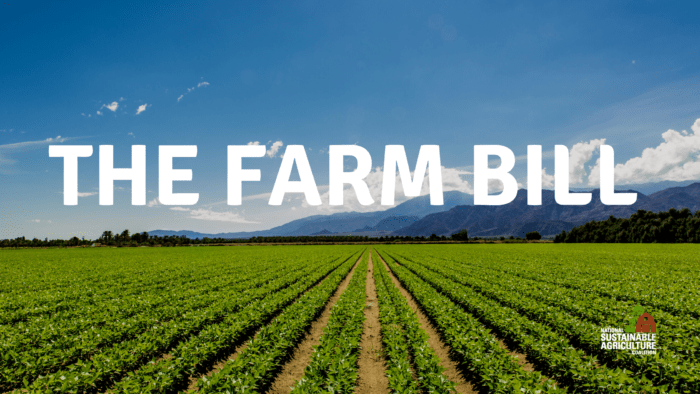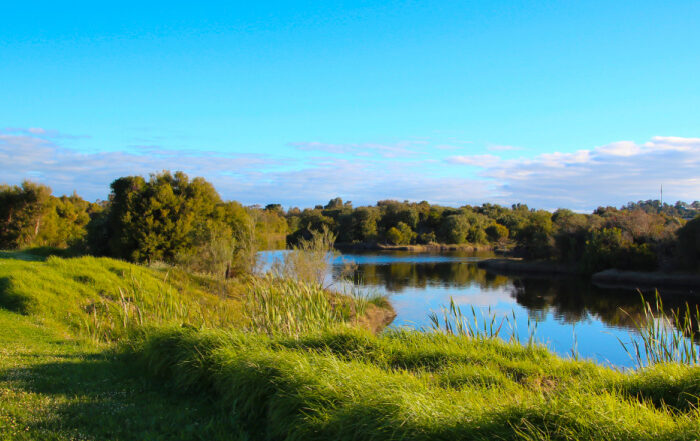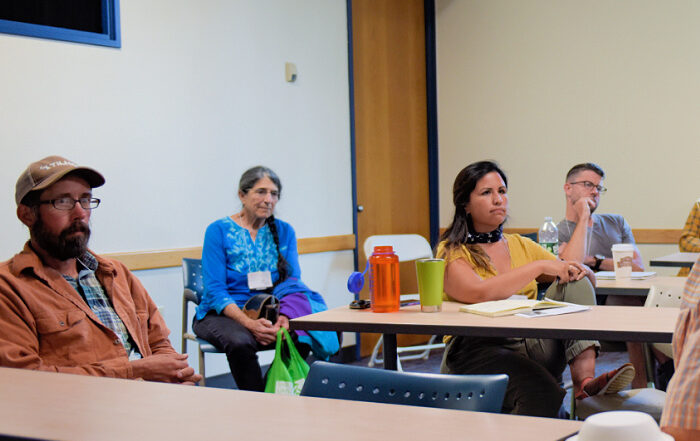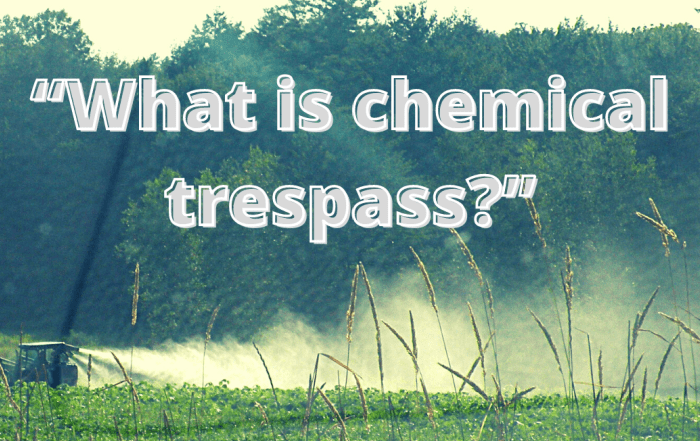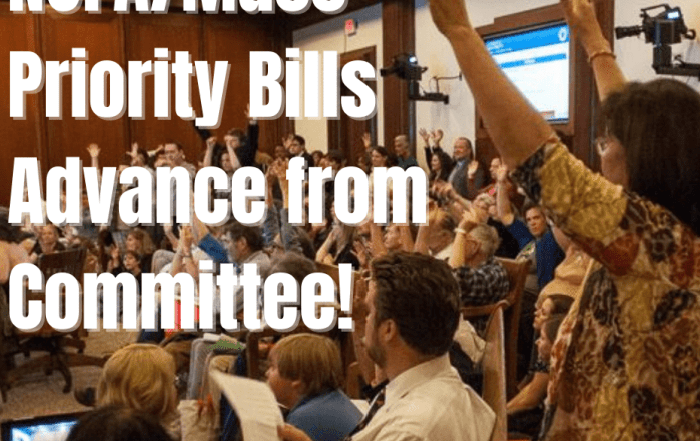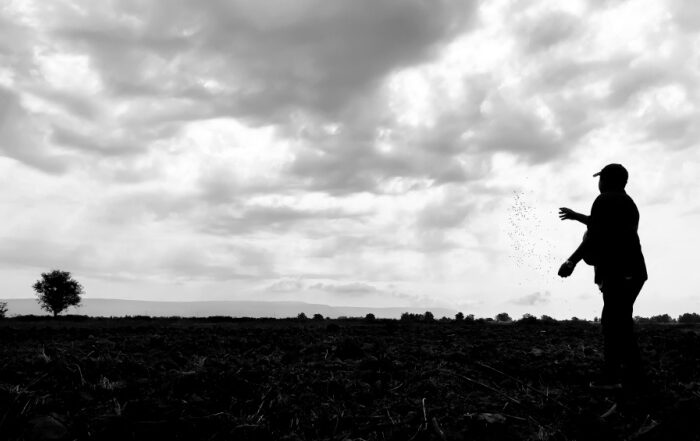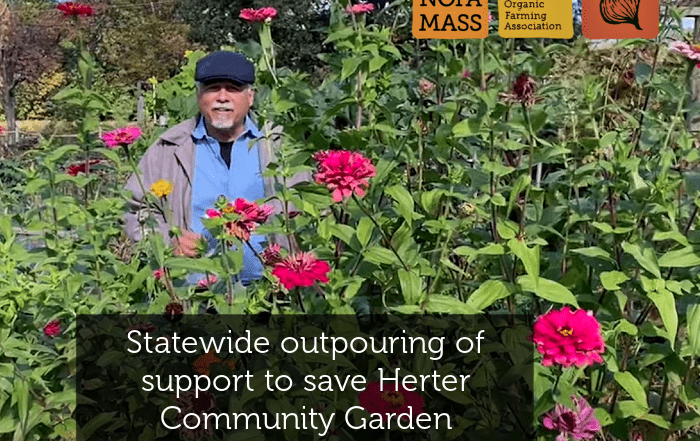Policy & Advocacy Work
NOFA/Mass advocates for sustainable agricultural and landcare policies that strengthen the resilience of our local communities. Our policy team works on issues as diverse as food, agricultural and climate justice, toxins reduction, pollinator protection, and ecological health and regulations which support organic and regenerative farms.
Our members drive our policy work at the local, state and federal level. The more members we have, the more resources we have to effect change in the world – we need financial resources to pay our organizers and, more importantly – people power to influence decision makers. Read on to find out how you can get involved, and please consider becoming a member and increase your impact by making a donation
Participate in the democratic process: Speak for the soils and an organic future!
Open Call for New NOFA/Mass Policy Committee Members!
Are you a community member, policy advocate, or farmer looking to get more involved in farming and food policy in Massachusetts? Consider joining NOFA/Mass’ Policy Committee! The Policy Committee works with the NOFA/Mass Policy Team to develop organizational positions on issues of public policy.
Current Action Alerts
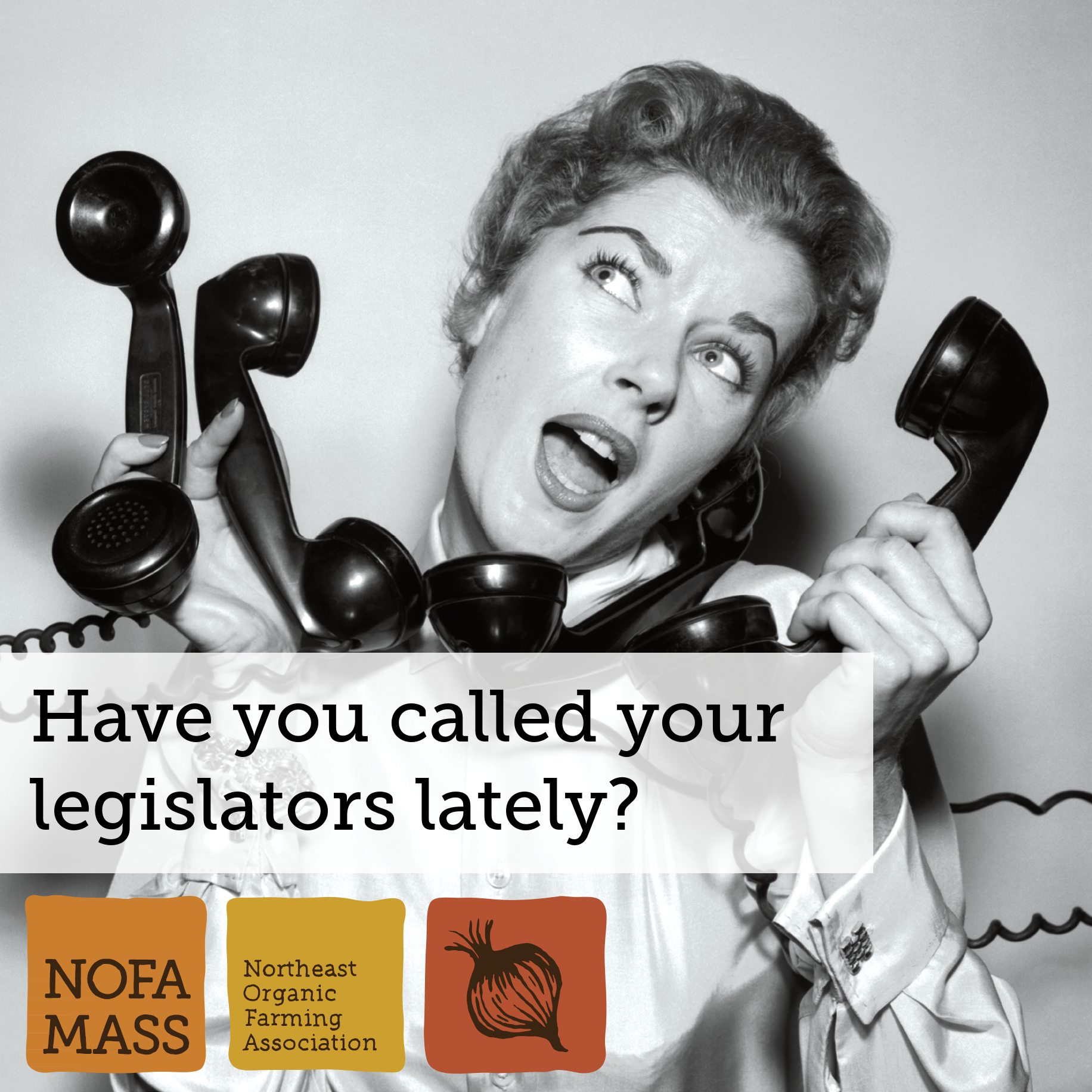
You have an opportunity to help create more biodiverse, equitable, and regenerative farms, increase soil health, reduce fossil fuels and pesticides in farming practices, and promote a community-based food system that is more resilient to climate change grounded in a long-term vision to transform the unsustainable and consolidated agricultural industry that is susceptible to systemic supply shocks, while extracting wealth from rural communities by asking your members of Congress to support a packet of bills that have been proposed for the 2024 (2025?) Farm Bill.
Increasing the number of cosponsors builds support for these bills and will make the provisions more likely to end up in the Farm Bill.
You can help, and it takes only moments – please use this form to encourage your Congressional delegation to cosponsor these bills.
Update August 2024
Help your state lawmakers prioritize pesticide reform. The more constituent contacts an office receives, the more likely they are to support a set of bills.
Click here to send an email (within seconds) to your state representative and senator asking them to support the NOFA/Mass Priority Pesticide Bills:
- Create a Pesticide Reform Task Force (S.521/H.783)
- Modernize pesticide reporting AND protect children from pesticide exposure (S.487/H.825)
- Promote Ecological Mosquito Control (S.445/H.845)
Pesticide Reduction is Climate Action
“Pesticides contribute significantly to greenhouse gas (GHG) emissions while, at the same time, climate change is expected to increase pesticide applications. It’s a vicious cycle.” – Pesticide Action Network, Pesticides & climate change: A vicious cycle
We need your help in making sure that pesticides reform stays on the top of mind for your legislators. Please contact your state representative and senator asking them to urge final passage of the NOFA/Mass Priority Pesticide/Toxin Bills:
Create a Pesticide Reform Task Force (S.521/H.783) – A bill to create a “pesticide control modernization and environmental protection task force” was recommended and “ought to pass” last session and is our top priority this session, as it will help address a host of systemic concerns in a holistic manner. Whatever your concerns are re: pesticides, you have a reason to support this bill.
Modernize Pesticide Reporting AND protect children from pesticide exposure (S.487/H.825) – This combined bill, which was approved by both chambers last year, would create an online portal and database for pesticide use reporting records with clear, online public access to the annual data and it would require that pesticides be proven safe before being used on playgrounds and fields where children learn and play.
Promote Ecological Mosquito Control (S.445/H.845) – We must end broadscale aerial application of pesticides and support a scientifically based mosquito-borne disease management program to protect public health while minimizing environmental and public health risks associated with some forms of (pesticide-dependent) mosquito control.
(These are our “top 3” – to keep things simple. You’ll find an extensive list of related bills with full details on the NOFA/Mass policy page.)
We set up this Action Network page to make it as easy as possible for people to send a quick email to their legislators. We encourage everyone to take this simple action… and if you want to be “extra,” pick up the phone and/or write a personalized email!
We don’t need to match the agri-chemical or fossil fuel companies dollar for dollar – we can beat their political capital with people power. (Of course, we appreciate your donations to keep us going!).
We are relying on the strength of this grassroots movement for pesticides reduction, so please: share this alert with your fellow earth-loving gardeners, farmers and food activists! (You might want to subscribe to the NOFA/Mass Policy Newsletter to get future alerts directly.)
Thank you, to all of you who have and will continue to help demonstrate to policy makers the sustained power of this community and the promise of the better world we’re growing together.
FAQs for Advocates
From our friends a The MA Food System Collaborative – thanks, Winton!
- Who are my legislators? (Find their contact info on the same page)
- How does the legislative process work in Massachusetts?
- Where can I find advocacy tips and information on running a campaign?
- I work for a nonprofit. Can I still be an advocate?
Here’s a super helpful orientation on the legislative process, from MassLegalServices.
Recent Victories
January 2023 – In the final hours of the informal session on January 3, 2023, the legislature passed a consolidated pesticide bill through both chambers (S.3181) which combined the provisions of two of our top priority pesticide bills: a measure to protect schoolchildren from pesticides (H.926) and a measure to modernize pesticide reporting (H.4931). The latter had been previously passed by the House in June 2022. This endorsement of these provisions during the informal session is a momentous victory for our movement and allows us to begin the 2023-24 formal session with fresh and significant momentum for pesticides reform.
September 2022 – Several significant pesticide reform measures were approved (reported favorably) by the Joint Committee on Environment, Natural Resources and Agriculture during the 2021-22 session, as well as measures regarding Food Justice and Equity in Agriculture.
Several proposals supported by the grassroots now have increased political momentum to build upon next session, including:
-Establishing a “pesticide control modernization and environmental protection task force” (H.4601)
-Limiting what pesticides can be applied to playgrounds (H.926)
-Digitizing annual pesticide reporting (H.4931)
-Banning consumer use of glyphosate-containing herbicides (H.929/S.575)
-Establishing a commission to address racial disparities in agricultural programs and create Community Land Trusts to create food security jobs (S.2880)
-Funding farming and food security jobs in frontline food insecure communities (S.564/H.973)
July 2022 – The MA Food System Collaborative led a successful campaign to include several important provisions in the 2023 state budget. In addition to increased funding for HIP, a provision for investment in UMass Extension was a top budget priority for NOFA/Mass, which we are grateful to see included. UMass Extension, which provides essential education and technical assistance to farmers, received $620,000 to upgrade their soil testing equipment and to hire new educators focused on issues such as soil health, urban agriculture, pollinators, and addressing invasive pests while reducing the use of pesticides.
October 2021 – As a direct result of increasing calls for pesticide reform, MDAR convened an official Conservationist Pesticide Advisory Council to advise the Pesticide Board on the development of statewide pesticide policies and regulations. Until recently, only the pesticide industry had an advisory council which advised the Board. Our calls for reform of pesticide rules through the regulatory process will be heard even louder moving forward.
April 2021 – As part of the FY22 budget, legislators approved an appropriation for $50,000 to create a commission to “conduct a scientific review of the potential impacts of glyphosate and its most common alternative herbicides on the environment and public health.” It will also include a review of the potential impacts of glyphosate on endangered and threatened species. The Pesticide Subcommittee is directed to use the scientific review as part of an individual review of glyphosate and whether current uses should be altered.
March 2021 – We successfully pressured the Mass. Pesticide Board Subcommittee to pass a motion to protect pollinators by restricting the use of neonicotinoid pesticides (“neonics”), effectively removing these pesticides from store shelves by July 2022. NOFA/Mass had been organizing with a coalition of beekeepers and environmentalists since 2015 to pass similar legislation and to hold state regulators accountable.
January 2021 – Governor Baker signed into law the Massachusetts Healthy Soils Bill as part of an Economic Development bill. This legislation was originally co-authored by NOFA/Mass Policy Director and is supported by a coalition of healthy soils advocates organized by NOFA/Mass. The bill creates a Healthy Soils Program within the MA State Commission for Conservation of Soil, Water & Related Resources. NOFA/Mass is now working with legislative allies to allocate supplemental funding for the program.
In 2018 the Secretary of the Executive Office of Energy an Environmental Affairs, after having heard a presentation on soil carbon restoration by former NOFA/Mass Policy Director Jack Kittredge, proposed a $100,000 budget appropriation to fund the creation of a Massachusetts Healthy Soils Action Plan. The contract was awarded to Regenerative Design Group, which invited to the project team two NOFA/Mass staff members, Caro Roszell and Marty Dagoberto. The results of the 18 month stakeholder engagement process are expected to be published spring 2021 and will provide a state-approved roadmap for policy makers and land managers.
August 2020 – we were successful in securing direct representation for organic agriculture on the “21st Century Mosquito Disease Management Task Force.” Working with a coalition of advocacy groups, we achieved significant redrafts of the Governor’s arbovirus management bill, limiting powers granted and providing for much greater transparency. We continue to advocate for an ecological approach to mosquito disease management.
Coalition Support
NOFA/Mass is part of several national coalitions and networks. Learn about our national partnerships and coalitions, here: Partnerships and Coalitions
Local Action
State Action – Our 2023-2024 Legislative Priorities
In Massachusetts, legislative sessions begin on January 1 and last two years. An average of 6,000-10,000 bills are filed every session. However, less than 10% are passed and become state law. Learn how bills are created and passed in the state legislature
Update, August 26, 2024: This was a disappointing legislative session for environmental and progressive state legislative campaigns across the board. Unfortunately the 2023-24 formal legislative session concluded on July 31st without any of our priority bills advancing to the floor for vote. However, it’s important to remember that during the final hours of the informal session in 2022 we DID have two of our bills pass both chambers, so it’s entirely possible that it could happen again!
Either way, it’s important to keep contacting your state legislators about active bills that are important to you: it’s a way to focus their attention, build awareness and support for reform. Even if they are unable to pass the bill, they will be more likely to be our champions and affect change through other means (remember the consumer ban on neonic pesticides we won in 2021?).
Below is a brief listing of our priority bills which are still technically alive and could be advanced before the informal session ends at the end of the 2024 calendar year:
Create a Pesticide Reform Task Force (S.521/H.783) – A bill to create a “pesticide control modernization and environmental protection task force” was advanced favorably last session and this session and is a top priority for pesticide reform advocates, as it will help address a host of systemic concerns in a holistic manner.
Center Farmers within PFAS reforms (H.4288) – NOFA/Mass is joining with a coalition of food system advocacy groups to encourage lawmakers to include in pending legislation measures to ensure that the burden of protecting our families and ecosystems from these “forever chemicals” does not fall on our farmers.
Modernize Pesticide Reporting AND Protect children from pesticide exposure (S.487/H.825) – This combined bill which was approved by both chambers last session would create an online portal and database for pesticide use reporting records with clear, online public access to the annual data and require that pesticides be proven safe before being used on playgrounds and fields where children (who are especially vulnerable to toxic pesticides) learn and play.
Promote Ecological Mosquito Control (S.445/H.845) – We must end the broadscale aerial application of pesticides and support a scientifically based mosquito-borne disease management program to protect public health while minimizing environmental and public health risks associated with some forms of (pesticide-dependent) mosquito control.
Read more about these and other important bills, below.
“An Act relative to the pesticide board”
S.521/H.783, by Sen. Jason Lewis & Representative Mindy Domb
Bill Status (August 31, 2024): Filed on January 20th, 2023 by Sen Jason Lewis & Representative Mindy Domb. Bill referred to the Joint Committee on Environment and Natural Resources and received a public hearing on May 10th, 2023. The bill was reported favorably by committee on April 22, 2024 and was referred to the committee on House Ways and Means.
Bill History: Drafted and advanced by Joint Committee on Environment, Natural Resources and Agriculture (ENRA) committee as H.4601 in March of 2022, recommended “ought to pass” and referred to House Ways and Means in April 2022. Bill had to be refiled with the start of the new session in January 2023.
Background
This comprehensive pesticide reform bill would establish a task force to be known as the “pesticide control modernization and environmental protection task force.” The task force would “review and make recommendations to improve the ability of the Commonwealth to prevent and mitigate adverse impacts of pesticide use on the environment and public health.”
Failure to provide required reports: Per MGL c. 132B § 5A, MDAR is required to submit an annual report to the Legislative Joint Committee on Environment, Natural Resources and Agriculture (ENRA) regarding efforts taken, and progress made toward reducing pesticide use in Massachusetts. Following public records requests, the Department could not produce a single annual report.
No useful data about pesticide use: Annual pesticide applicator usage reports exist only in physical paper form and are not available digitally or online. The existing reports are very limited, and, for example, do not track geographic data on pesticide applications. There is no baseline for statewide pesticides use.
Lack of regulatory transparency: As of October 2022, the most recent minutes of the pesticide board subcommittee posted online are from 2018. Subcommittee cover sheets detailing pesticide products to be registered are not published with meeting announcements or to the website. Presentations and reports are not posted either.
Lack of public input: The Pesticide Board and the Pesticide Board Subcommittee do not solicit public comment on agenda items such as pesticide registrations and rarely acknowledge written comments. Public Hearings are the rare occasion when public comments are solicited.
Lack of priority for environmental concerns: The thirteen-member Pesticide Board has only one designated public seat for the environmental community and it has been unfilled since at least November 2021.
Pressure from legislators is critical. It wasn’t until 6 months after the precursor of this bill was filed in March 2021 (H.922) that MDAR announced it was establishing a new Pesticide Advisory Council to represent “conservationist interests.” Prior to 2022, the only Pesticide Advisory Council established under 333 CMR 4 (2004) represented pesticide applicators.
Details of the bill
The task force will consist of members/designees of EOEEA (chair), MDAR, DEP, DPH, ENRA Committee, Public Health Committee, Consumer Protection Committee, minority leaders and 19 additional members appointed by ENRA chairs, including: an academic expert in environmental or health impacts of pesticides, an ecotoxicologist, a licensed pesticide applicator, a representative of pesticide manufacturers, a veterinarian with expertise in pesticide impacts on animals, a member of a town natural resources commission or equivalent, a member of a city natural resources commission or equivalent and representatives of statewide organizations representing (one each) land conservation, river protection, wildlife protection, farms and agriculture, organic farms and agriculture, beekeepers or groups concerned about pollinators, lawn care, nursery and landscape, consumer protection, horticultural or grower association, cranberry growers, retailers.
The issues examined by the task force shall include, but not be limited to:
(i) the structure, membership, and operation of the pesticide board and the pesticide board subcommittee within the department of agricultural resources;
(ii) the ability of the pesticide board and pesticide board subcommittee to effectively interact with other state agencies, stakeholders, and the public;
(iii) the commonwealth’s relationship with federal pesticide regulators and ability to implement federal pesticide regulations on the state level in a manner consistent with pesticide use reduction goals;
(iv) the effectiveness of chapter 132B of the general laws and other state and federal statutes in reducing harmful impacts of pesticide use;
(v) the ability of the pesticide board and the pesticide board subcommittee to quickly and effectively implement science-based regulation of pesticides and pesticide products;
(vi) the effectiveness of the commonwealth’s licensing and continuing education process for pesticide users in promoting responsible, limited use of pesticides and reducing adverse impacts of pesticide use;
(vii) the implementation of section 5A of said chapter 132B as it pertains to pesticide use reduction and annual reporting requirements;
(viii) opportunities to expand integrated pest management planning and practices to additional public lands;
(ix) the accessibility and transparency of the commonwealth’s pesticide use reporting system; and
(x) public awareness and education regarding pesticide use and its environmental and health impacts.
“An Act protecting our soil and farms from PFAS contamination”
H.4288, filed by Senator Jo Comerford and Rep. Paul Schmid
Bill Status (August 31, 2024): Filed originally as S.39/H.101 on January 20th, 2023 by Senator Jo Comerford and Rep. Paul Schmid. Bill was referred to the joint Committee on Agriculture and received a public hearing on May 15th, 2023. The bill accompanied a new draft (H.4288) on January 29th, 2024 as it was reported favorably to the committee on House Ways and Means.
Background
NOFA/Mass is joining with a coalition of food system advocacy groups to encourage lawmakers to include in pending legislation measures to ensure that the burden of protecting our families and ecosystems from these “forever chemicals” does not fall on our farmers.
The chemicals known as per- and polyfluoroalkyl substances (PFAS) have been widely used since the 1950s in products ranging from food packaging to fire fighting foam. PFAS have recently been recognized as contaminants in agriculture and are believed to largely be entering soil through the application of biosolids, industrial sludges and ashes, and contaminated compost which may contain these compounds that are difficult to break down. (Visit our PFAS resources page, here.)
Farmers want to enhance their role in ensuring that the food supply is safe. This legislation was drafted with direct input from farmers and farmer-advocacy organizations. As new regulations and laws about PFAS come out, we need to ensure the ability of Massachusetts farmers’ to continue producing food and remain financially viable.
What this bill would do:
This bill will provide financial and liability relief should farmers’ ability to grow crops be impacted by PFAS contamination. It will also provide funding for technical assistance and education to help farmers adapt to new practices that reduce the use and dispersion of PFAS.
An Agricultural PFAS Relief Fund will fund the testing of soil, water, or agricultural products for PFAS; pay for costs incurred from adapting management and business practices as a result of prohibiting PFAS-containing inputs; income replacement for interrupted operations due to discovery of contaminated land and provide for potential land buy-outs; educational resources for farmers; remediation practices and needed infrastructure for the elimination of PFAS, and other similar costs.
This bill helps set some standards for the production and use of certain soil amendments that have been known to be vectors for PFAS and prohibits the retail sale of any fertilizer, compost, mulch, top soil replacement, or other soil amendments that have not been tested for the presence of PFAS.
Finally, the bill will mitigate any potential further PFAS contamination of agricultural soils. Currently there is no testing for PFAS of biosolids, which are often applied as a fertilizer in conventional agriculture nor is there tracking of where treated biosolids are spread in Massachusetts. This bill will require testing of treated sewage sludge for PFAS if it is being used to fertilize agricultural land or other land application uses and track where it is spread.
“An Act relative to pesticides.”
S.487/H.825, filed by Senator Paul Feeney & Rep. James Hawkins
Bill Status (August 31, 2024): Filed on January 20th, 2023 by Senator Paul Feeney and Rep. James Hawkins. Bill was referred to the Joint Committee on Environment and Natural Resources where it received a hearing on May 10th, 2023. The bill was reported favorably by committee and referred to the committee on House Ways and Means on September 7th, 2023.
Bill History: In the final hours of the 2022 informal session on January 3, 2023, the legislature passed a consolidated pesticide bill through both chambers (S.3181) which combined the provisions of two of our top priority pesticide bills: a measure to protect schoolchildren from pesticides (H.926 in the ’21-’22 session) and a measure to modernize pesticide reporting (H.4931 in the ’21-’22 session). The latter had been previously passed by the House in June 2022. This endorsement of these provisions during the informal session is a momentous victory for our movement and allows us to begin the 2023-24 formal session with fresh and significant momentum for pesticides reform.
Action requested: Contact your State Senator and Representative and ask them to “please cosponsor S.487/H.825.” Share your thoughts on why this bill is needed and feel free to pull from the talking points, below. Click here to send a quick email within seconds.
We need to protect wildlife and children from pesticides!
This bill would:
- require MDAR (Dept. of Agricultural Resources) to use an online database for pesticide use reporting records
- require the use of integrated pest management plans on the lands of public institution of higher education (it’s already required for K-12)
- only pesticides considered minimum risk by the U.S. EPA and those permitted for organic use will be allowed near schools and child care centers in Massachusetts (except in the case of a health emergency when school officials could apply for a waiver).
Background on the pesticide reporting/rodenticide aspect of this bill:
A female bald eagle found dead in her nest on the Charles River in March 2021 suffered a fatal hemorrhage after consuming smaller animals who had themselves consumed rat poison, as confirmed by MassWildlife officials. This is the first confirmed case of such poisoning in Massachusetts and evokes a clarion call to reign in pesticides use in our Commonwealth.
According to information presented by Raptors Are the Solution (RATS):
- Of the 161 dead raptors submitted to and tested at Tufts Wildlife Clinic in a study between 2006 and 2010, 86% had poison residues in their liver tissues.
- For an additional 94 Massachusetts raptors necropsied from 2012 through 2017 at Tufts, 96% had detectable poisons
- 9 Snowy Owls died from lethal levels of rodenticides while they were in Massachusetts over the winter of 2017/18 (from Mass Audubon)
The Charles River eagle was the victim of second-generation anticoagulant rodenticide (SGAR) poisoning. As explained by MassAudubon:
“Second-generation anticoagulants don’t kill rodents immediately. While these rodenticides can kill rats with a single dose (which is why many consumers prefer them), poisoned rats can still live for a few days and continue eating poisoned bait. This delay means that rats can ingest enough poison to kill a much larger animal by the time they finally succumb. While any rodenticide can kill a raptor, second-generation anticoagulants are the most dangerous.”
While personal use of these second-generation anticoagulants (SGARS) is already banned in MA, licensed pest companies can still use it when hired to deal with rodent problems.
Proposed legislation, “An Act relative to pesticides,” would do more than protect raptors like bald eagles. It could go a long way to helping us reduce pesticides use across the Commonwealth.
The original rodenticide (2021) legislation was cosponsored by Animal Legal Defense Fund, The Humane Society of the United States – Massachusetts, Mass Audubon, MSPCA, New England Wildlife Center, NOFA/Mass and Raptors Are The Solution (RATS) and endorsed by The Center for Biological Diversity, MASSPIRG and the Massachusetts Sierra Club.
Background on the schoolchildren pesticides protection aspect of this bill:
(also filed separately as HD.1585, “An Act Relative to improving pesticide protections for Massachusetts schoolchildren, ” by Rep. Carmine Gentile and Rep. Mary Keefe
Many Massachusetts schools and child care centers permit the use of an arsenal of toxic pesticides on outdoor grounds, including glyphosate and 2,4-D, potentially endangering children’s health.
Children are especially vulnerable to toxic pesticides.
- Children absorb more pesticides relative to their body weight than adults.
- Children’s organ systems are still developing and are less able to detoxify harmful chemicals.
- In 2012 the American Academy of Pediatrics (AAP) called for governments to reduce children’s exposure to pesticides writing that scientific evidence “demonstrates associations between early life exposure to pesticides and pediatric cancers, decreased cognitive function, and behavioral problems.”
Learn more about children and pesticides HERE
This bill has been endorsed by DOZENS of advocacy groups and school-related organizations, including the 25,000 physician, resident, and student members of the Massachusetts Medical Society (MMS) and the Greater Boston Physicians for Social Responsibility. See our updated list, here. In 2010 NY passed a similar law, as did CT in 2015.
Related bill: “An Act to restrict the use of pesticides around children”
SD.199, filed by Sen. Bill Brownsberger
This bill clarifies the definitions of areas where youth are to be protected from pesticides regardless of whether the application-hiring entity is public or private.
S.445/H.845, filed by Senator Jo Comerford and Rep. Kathleen Lanatra
Bill Status (August 31, 2024): Filed on January 20th, 2023 by Senator Jo Comerford and Rep Kathleen Lanatra. Bill was referred to the Joint Committee on Environment and Natural Resources and received a public hearing on May 10th, 2023. The bill was reported favorably by committee and referred to the committee on Senate Ways and Means on March 21st, 2024.
This legislation replaces the Commonwealth’s outdated and expensive mosquito management system with one that is more effective, affordable, transparent, ecologically responsible, and scientifically based. See/share our coalition fact sheet, here.
NOFA/Mass supports a scientifically based mosquito-borne disease management program to protect public health while minimizing environmental and public health risks associated with some forms of mosquito control. The existing programs for mosquito control in Massachusetts are antiquated and fragmented, and reform is needed.
Ecological mosquito management prioritizes preventative measures, and includes:
- Monitoring and surveillance
- A strong focus on public education and personal protective measures
- Emphasis on eliminating breeding sites
- Consideration of local ecology
- A tiered approach to management:
- Non-toxic approaches, such as habitat manipulation must be attempted first
- Larvaciding should be conducted based on monitoring for predefined thresholds
- Adulticiding (spraying for adult mosquitoes) should be permitted only during public health emergencies, when there is significant threat of mosquito-borne disease based on predefined thresholds, and all other, less toxic methods have been attempted and found ineffective
In coordination with numerous advocacy organizations, NOFA/Mass is supporting as a priority:
S.445/H.845, filed by Senator Jo Comerford and Rep. Kathleen Lanatra
- Protect health and the environment by prioritizing public education, mosquito monitoring, and habitat modification, and only using pesticides when scientifically defined levels of disease carrying mosquitoes have been found in the area.
- Increase funding and capacity for mosquito monitoring, surveillance, and public education efforts.
- Provide full transparency and accountability within any mosquito borne disease management program, including publicly available notification around larviciding and adulticiding applications, and honoring local opt out agreements.
- Prohibit aerial spraying of pesticides
Please see our coalition website for extensive resources on ecological mosquito control and more details on this proposed legislation: https://www.nofamass.org/massquito/
See/share our coalition fact sheet, here.
Take action within seconds on this “click and send” action page.
Related: “An Act relative to pesticide applications”
S.575, filed by Sen. Bruce Tarr
Bill Status (Jan. 23, 2023): Filed on January 20th, 2023 by Sen. Bruce Tarr and now accepting cosponsors! (There is currently only a senate version of this bill.)
The current process for individuals to “opt out” of mosquito spraying is cumbersome and confusing. Private residents who wish to avoid being sprayed must submit an opt out request annually and to post signs saying “no spray” along their property border.
This bill seeks to create simple, alternative exclusion processes for residents from wide area pesticide applications by the state (such as by the Mosquito Control Board). Alternatives might include allowing residents to opt-out through their annual town or city census form.
“An Act empowering towns and cities to protect residents and the environment from harmful pesticides”
S.2729/H.4794 filed by Senator Susan Moran & Representative Carmine Gentile
Bill Status (August 31, 2024): Filed originally as S.540/H.814 on January 20, 2023 by Senator Susan Moran and Rep. Carmine Gentile. Bill was referred to the Joint Committee on Environment and Natural Resources and received a public hearing on May 10th, 2023. On April 16th, 2024 the Senate bill accompanied a new study order (S.2729) and was reported favorably by committee and referred to the Joint Committee on Rules. On April 22nd, 2024 the order was discharged to the committee on Senate Rules. On July 11th, 2024 the house bill accompanied a new study order (H.4794) and was reported favorably to the Joint Committee on Rules and subsequently discharged to the committee on House Rules.
Prior to the passage of the Massachusetts Pesticide Control Act, M.G.L. 132B in 1978, Massachusetts municipalities had the right to restrict pesticides on all public and private land within their jurisdictions.
With pressure from the pesticide industry in the late 1970s, states across the country, including Massachusetts, passed legislation prohibiting cities and towns from adopting local pesticide ordinances more restrictive than state regulations. The Massachusetts Pesticide Board of the Department of Agricultural Resources currently decides which toxic pesticides are approved for use in Massachusetts (sold in local stores, used on lawns, gardens,playing fields, farms, etc.) and they rarely see a pesticide they don’t like.
Cities and towns have no say in which chemicals are used in their communities.
Current legislation, “An Act empowering towns and cities to protect residents and the environment from harmful pesticides” would give local communities the power to make these important decisions once again.
This bill would return power to communities to protect their families, food and water from harmful pesticide exposure. With the approval of a municipality’s Board of Health, a city or town government would be able to “restrict or prohibit the use and application or disposal of pesticides within the city or town that are more stringent than the standards and restrictions [adopted by the state].”
Fact sheet on state preemption of pesticides regulation, from Beyond Pesticides.
“An Act to protect pollinator habitat” – a priority of the NOFA/Mass Pollinator Network (MAPN)
S.2728/H.4562, filed by Rep. Mary Keefe and Sen. Jason Lewis
Bill Status (August 31, 2024): Filed originally as S.520/H.843 on January 20, 2023 by Rep Mary Keefe and Sen. Jason Lewis. Bill was referred to the Joint Committee on Environment and Natural Resources and received a public hearing on May 10, 2023. The bill accompanied a new draft (S.2728/H.4562) on April 22, 2024 and was reported favorably to the Joint Committee on Rules. On May 9, 2024 the House bill was discharged to the committee on House Rules. On May 20, 2024 the Senate resolve was reported favorably and referred to the committee on Senate Ways and Means.
In Massachusetts, over 45% of agricultural commodities rely on pollinators, mainly wild and managed bees, for pollination.
Insect biomass and biodiversity are in decline globally, and pollinators are an especially vulnerable group. We are have already seen a loss of pollinator diversity right here in New England.
The loss and degradation of natural habitat is a primary driver of pollinator declines around the globe, along with pesticide exposure, climate change, and disease.
This bill would:
- Establish a commission to study statewide opportunities for improving pollinator health by increasing and enhancing native habitat
- Includes both developed and natural areas, such as farm field borders, urban areas, and transportation corridors
- Examine many issues relevant to pollinator health, including current laws and regulations, public awareness, funding, best management, practices, and the use of agricultural and non-agricultural lands
“An Act regarding raw milk” – a priority of the MA Raw Milk Network
S.2626, Filed by Senator Anne Gobi
Bill Status (August 31, 2024): Filed originally as S.43 on January 20, 2023 by Sen. Anne Gobi. Bill was referred to the Joint Committee on Agriculture and received a public hearing on May 1, 2023. On February 8, 2024 the bill accompanied a study order (S.2626), was reported favorably by committee, and was referred to the Joint Committee on Rules. On February 12, 2024 the order was discharged to the committee on Senate Rules.
NOFA/Mass believes that raw milk, when handled correctly, is a safe and highly nutritious food. Currently, raw milk is only allowed to be sold from a certified raw milk producer’s property. We support bill S.43, filed by Sen. Anne Gobi, which would allow for the delivery of raw milk directly to customers as long as the milk has been sold prior to delivery.
Right now, there are very few raw milk dairies in the densely-populated eastern part of the state. Customers who want raw milk from this area often have to drive for an hour or more to a raw milk dairy. By opening up the market through delivery, the raw milk market would serve more customers and increase the economic vitality of small dairies.
Under this bill, raw milk farmers would be allowed to deliver milk, including by third party delivery, directly to a contracted consumer off-site from the farm, through a CSA, at a farm stand, to a residence, or to an established, non-retail receiving site. If delivered to a retail establishment, it would be accessible only to the directly contracted customers.
Read more about raw milk and find your nearest dairy at the Mass. Raw Milk Network, a project of NOFA/Mass.
“An Act relative to maintaining adequate water supplies through effective drought management”
S.475/H.861, filed by Sen. Jamie Eldridge and Rep. Joan Meschino
Bill Status (August 31, 2024): Filed on January 20, 2023 by Sen. Jamie Eldridge and Rep. Joan Maschino. Bill was referred to the Joint Committee on Environment and Natural Resources and received a public hearing on April 26, 2023. The bill was reported favorably by committee and referred to the committee on Ways and Means on February 5, 2024.
Summer 2016 and 2020: Many rivers throughout Massachusetts experienced record low flows, and portions of some major rivers, such as the Ipswich and Parker, went dry. Several municipal water sources became depleted, posing a challenge for water suppliers.
With climate change scientists predicting increases in both short-term floods and droughts in Massachusetts, we must be prepared for both extremes.
An important goal of drought resilience is to sustain streamflow, groundwater levels, and water supplies for as long as possible when precipitation is scarce. The most effective, immediate, and least costly way to achieve this is to conserve water during a drought.
THE PROBLEM
● Massachusetts lacks authority to require water conservation during a drought. Despite the severity of the drought of 2016, the Executive Office of Energy and Environmental Affairs Secretary could recommend outdoor watering restrictions but could not require them.
● Streams across the state dried up in 2020, like Stony Brook in Chelmsford, Buttonwood Brook in Dartmouth, Deer Brook in Northampton, Churchill Brook in Pittsfield, and Jacksaw Brook in Westborough.
● Massachusetts farmers sustained economic losses of $18M during the 2016 drought due to crop failures, including damage to our iconic cranberry bogs.
● Local boards of health reported private well failures from 220 private residences during the 2016 drought and there were six public water supply emergency declarations.
THE SOLUTION This bill would give the Commonwealth the authority to restrict non-essential outdoor watering during droughts, ensuring that our water supply can sustain public health and our environment.
● Nonessential outdoor water use restrictions would gradually escalate as drought levels worsen, as detailed in the State’s 2019 Drought Management Plan.
● These restrictions would apply to all water users within a drought region.
● Agricultural water users would be exempted.
“An Act promoting equity in agriculture”
S.41/H.87, filed by Senator Jo Comerford and Rep. Natalie Blais
Bill Status (August 31, 2024): Filed on January 20, 2023 by Sen. Jo Comerford and Rep. Natalie Blais. Bill was referred to the Joint Committee on Agriculture and received a public hearing on May 8, 2023. On July 31, 2023, the bill was reported favorably by committee and referred to the Joint Committee on Rules. On September 25, 2023 the committee recommended that the bill ought to pass and was referred to the committee on Ways and Means.
According to the 2017 USDA Census of Agriculture, BIPOC farmers are represented on only 2.3% of the Commonwealth’s farms, farms that steward just .3% of the land in farming and sell just .4% of the market value of agricultural goods in the Massachusetts, despite people of color making up 29% of the state’s population. These bills will establish a commission charged with developing recommendations for MDAR to equitably serve socially disadvantaged farmers to address these disparities.
Bill Status (August 31, 2024): Filed originally as S.507/H.828 on January 20, 2023 by Sen. Patricia Jehlen and Rep. Vanna Howard. On February 16, 2023 the bill was referred to the Joint Committee on Environment and Natural Resources. On April 13, 2023 the bill was discharged to the Joint Committee on Agriculture and received a public hearing on May 8, 2023. The bill accompanied a new draft (H.4226) on December 26, 2023 as it was reported favorably to the House Committee on Ways and Means
Bill Status (August 31, 2024): Filed on January 20, 2023 by Sen. Patricia Jehlen and Rep. Vanna Howard. On February 16, 2023 the bill was referred to the Joint Committee on Environment and Natural Resources. On April 6, 2023 the bill was discharged to the Joint Committee on Agriculture and received a public hearing on May 8, 2023. On February 5, 2024 the bill was reported favorably by committee and referred to the committee on House Ways and Means.
NOFA/Mass is supporting two bills related to Food Justice which were previously supported by the Mass Renews Alliance in 2021-22, a coalition of labor, youth, traditional environmentalist, and social and environmental justice organizations renewing Massachusetts’ commitment to racial, climate & economic justice. Read about the Mass Renews Alliance Policy Framework, here.
These Food Justice bills will bring more fresh local food to families in need and will create food-security jobs for people throughout Massachusetts, empowering communities to tailor solutions to their local needs.
“An Act relative to establishing a food justice frontline”
SD.902/HD.2115, filed by Sen. Patricia Jehlen and Rep. Vanna Howard
This bill provides funding to nonprofit organizations to hire individuals living in frontline, marginalized, and low-income communities for well-compensated food security jobs, offering efficient, effective solutions to meet local food security needs.
“An Act relative to food justice with jobs”
HD.3366, filed by Rep. Adrian C. Madaro
Bill Status (Jan. 23, 2023): Filed on January 20th, 2023 by Sen. Patricia Jehlen and Rep. Vanna Howard and now accepting cosponsors!
This bill would have created Community Land Trusts in food insecure communities in order to grow more food and create food security jobs. This measure includes soil health in Community Agriculture Standards. You can find a detailed breakdown of the original bill, here.
“An Act relative to pesticide applications”
S.2650, filed by Sen. Bruce Tarr
Bill Status (August 31, 2024): Filed originally as S.575 on January 20, 2023 by Sen. Bruce Tarr. Bill referred to the Joint Committee on Environment and Natural Resources and received a public hearing on May 10, 2023. On February 15, 2024 the bill accompanied a new study order (S.2650), was reported favorably by committee, and was referred to the Joint Committee on Rules. On February 20, 2024 the study order was discharged to the committee on Senate Rules.
Bill Status (Jan. 23, 2023): Filed on January 20th, 2023 by Sen. Bruce Tarr and now accepting cosponsors! (There is currently only a senate version of this bill.)
The current process for individuals to “opt out” of mosquito spraying is cumbersome and confusing. Private residents who wish to avoid being sprayed must submit an opt out request annually and to post signs saying “no spray” along their property border.
This bill seeks to create simple, alternative exclusion processes for residents from wide area pesticide applications by the state (such as by the Mosquito Control Board). Alternatives might include allowing residents to opt-out through their annual town or city census form.
Read more about mosquito spraying, opting out, and the need for reform on the MassQuito Coalition site, here.
“An Act protecting pollinators by eliminating harmful products”
S.479 Sen. Jamie Eldridge
Bill Status (August 31, 2024): Filed on January 20, 2023 by Sen. Jamie Eldridge. Bill referred to the Joint Committee on Environment and Natural Resources and received a public hearing on May 10, 2023. On March 25, 2024 the bill was reported favorably by committee and referred to the committee on Senate Ways and Means.
A 2019 Scientific Literature Review performed by the Mass. Dept. of Agricultural Resources found that the broad majority of impact-based studies reviewed (42 of 43) cited neonicotinoid insecticides (“neonics”) as a contributor to pollinator declines. In response, the department subsequently decided to end consumer use of neonic products. However, the agricultural sectors use significantly higher volumes of these pollinator-killing pesticides. A recent study found that U.S. Agriculture is 48 times more toxic to insect life than it was in the early 1990s; neonicotinoids account for more than 90% of that increase.
This bill would protect pollinators by making it illegal for any neonic product to be “sprayed, released, deposited or applied on any property within the commonwealth.” However, the bill does exempt neonic-treated nursery plants from the prohibition.
“An Act Governing the use of pesticides containing the herbicide substance Glyphosate in the commonwealth”
S.516/H.813: Sen. Jason Lewis and Rep. Carmine Gentile
Bill Status (August 31, 2024): Filed on January 20, 2023 by Sen. Jason Lewis and Rep. Carmine Gentile. Bill was referred to the Joint Committee on Environment and Natural Resources and received a public hearing on May 10, 2023. The bill was reported favorably and referred to the committee on House Ways and Means on March 21, 2024.
This “probable human carcinogen” (as determined by the World Health Organization), is the world’s most commonly used herbicide. Recent studies have found glyphosate residues in lakes, rivers, rainwater, soil and in human urine.
As the latest scientifically-validated proverbial nail in the coffin (hopefully) for glyphosate, a draft biological evaluation released on Nov. 25th, 2020, by the US Environmental Protection Agency (really!) concludes that glyphosate is likely to adversely affect 93% of threatened and endangered species.
Fortunately, proposed state legislation which would ban consumer use of glyphosate was approved by the Joint Committee on the Environment, Natural Resources and Agriculture during the 2019-20 session. We are now asking them to report this bill out favorably again in 2021 in hopes that it can make it to the floor for a full vote.
What would this bill do?
This bill, quite simply, would restrict the purchase and use of glyphosate-containing herbicides to licensed pesticide applicators and remove such products from retail stores.
Find our resource page on the human health risks associated with glyphosate.
“An Act relative to the use of glyphosate on public lands”
SD.1007: Senator Jason Lewis
Bill Status (August 31, 2024): Filed on January 20, 2023 by Sen. Jason Lewis. Bill was referred to the Joint Committee on Environment and Natural Resources and received a public hearing on May 10, 2023. On March 25, 2024 the bill was reported favorably by committee and referred to the committee on Senate Ways and Means.
This bill would end the application of glyphosate on any public lands owned or maintained by the Commonwealth without a special permit (and only when the a situation “poses an immediate threat to human health and the environment” and “there is no viable alternative to the use of the proposed glyphosate herbicide.” It would also outlaw the use of “any pesticide in a manner inconsistent with its label.”
“An Act relative to the pesticide board”
S.461: Sen. Julian Cyr
Bill Status (August 31, 2024): Filed on January 20, 2023 by Sen. Julian Cyr. Bill was referred to the Joint Committee on Environment and Natural Resources and received a public hearing on May 10, 2023. On March 21, 2024, the bill was reported favorably by committee and referred to the committee on Senate Ways and Means.
This bill would require commissioner of food and agriculture to “consult and concur with the commissioner of environmental protection and commissioner of public health when rendering a decision… relative to the protection of groundwater sources of drinking water from pesticide contamination.”
“An Act relative to banning Chlorpyrifos in the Commonwealth”
H.4668 filed by Rep. Kenneth Gordon
Bill Status (August 31, 2024): Filed originally as H.821 on January 20, 2023 by Rep. Kenneth Gordon. Bill was referred to the Joint Committee on Environment and Natural Resources and received a public hearing on May 10, 2023. On May 23, 2024, the bill accompanied a study order (H.4668), was reported favorably by committee, and was discharged to the committee on House Rules.
For half a century, staple food crops in the United States — such as corn, wheat, apples and citrus — have been sprayed with chlorpyrifos, an organophosphate pesticide that can permanently damage the developing brains of children, causing reduced IQ, loss of working memory, and attention deficit disorders. The U.S. Environmental Protection Agency’s own scientific analysis (2016)showed that the amount of chlorpyrifos ingested by young children through sprayed fruits and vegetables could exceed safety levels by 140 times.
This bill would prohibit the use of “chlorpyrifos or any products containing chlorpyrifos for use on agricultural land or crops within the Commonwealth of Massachusetts without (i) license issued by the State or any agency of the federal government to conduct chlorpyrifos research; or (ii) a permit issued by the State to apply chlorpyrifos because there is no viable alternative to the use.” It would also establish a “task force to study the impact of using chlorpyrifos in non-agricultural settings in Massachusetts.”
“An Act relative to increased protection of wildlife management areas,”
(H.4794) filed by Rep. Danillo A. Sena
Bill Status (August 31, 2024): Filed originally as H.904 on January 20, 2023 by Rep. Danillo A. Sena. Bill was referred to the Joint Committee on Environment and Natural Resources and received a public hearing on October 11, 2023. On July 11, 2024 the bill accompanied a new study order (H.4794), was reported favorably by committee, and discharged to the committee on House Rules.
According to the original proposed legislation: On or before January 1, 2030, a minimum of 30% of all Wildlife Management Area lands, representative of all eco-regions in the state, would be designated as permanent Wildlife Management Area Nature Reserves to be monitored and maintained as nearly as possible as intact ecosystems in a natural condition for the purposes of biodiversity maintenance, nutrient cycling and soil formation, long‐term carbon sequestration, protection of late-successional and old growth forest habitats, and opportunities for wilderness recreation.
“An Act establishing the commission on extended producer responsibility”
H.833 filed by Rep. Brad Jones
Bill Status (August 31, 2024): Filed on January 20, 2023 by Rep. Brad Jones. Bill was referred to the Joint Committee on Environment and Natural Resources and received a public hearing on June 14, 2023. On March 21, 2024 the bill was reported favorably by committee and referred to the Joint Committee on Rules. On April 8, 2024 the bill was discharged to the committee on House rules
This bill creates a commission to develop recommendations toward implementing a statewide policy structure for extended producer responsibility having assessed the economic, environmental, and public health benefits and costs relating to the manufacture and post-consumer management of products.
“An Act regulating cottage foods”
H.4522 Rep. Erika Uyterhoeven
Bill Status (August 31, 2024): Filed originally as H.915 on January 20, 2023 by Rep. Erika Uyterhoeven. Bill was referred to the Joint Committee on Environment and Natural Resources, then discharged to the committee on Agriculture on April 6, 2023, and received a public hearing on May 8, 2023. On April 8, 2024, the bill accompanied a new study order (H.4522), was reported favorably by committee, and was discharged to the committee on House Rules.
This bill would enable all home cooks throughout Massachusetts to sell their low-risk homemade food products without a health department permit, including foods from a variety of cultures, such as jams, nut mixes, breads, tortillas, fruit empanadas, cookies, churros, coffee beans and pickled vegetables.
H.4668 Rep. Patrick Kearney
Bill Status (August 31, 2024): Filed originally as H.840 on January 20, 2023 by Rep. Patrick Kearney. Bill was referred to the Joint Committee on Environment and Natural Resources and received a public hearing on May 17, 2023. On May 23, 2024, the bill accompanied a new study order (H.4668), was reported favorably by committee, and was discharged to the committee on House Rules.
Removes the use of waste-to-energy municipal solid waste plant technology and forest-derived biomass from the Commonwealth’s alternative energy portfolio, removing subsidies for this form of energy production.
Read more about the problems with biomass-based energy production, here.
Other bills we’re supporting/following, 2023-24 State Legislative Session
NOFA/Mass also endorses the Massachusetts legislative priorities of several in-state coalitions:
 The Massachusetts Food System Collaborative (MFSC) was created following the completion of the Massachusetts Local Food Action Plan in December 2015. The goals of the Collaborative are to promote, monitor, and facilitate implementation of the Plan. The Collaborative’s work focuses on the four main goals of the Plan:
The Massachusetts Food System Collaborative (MFSC) was created following the completion of the Massachusetts Local Food Action Plan in December 2015. The goals of the Collaborative are to promote, monitor, and facilitate implementation of the Plan. The Collaborative’s work focuses on the four main goals of the Plan:
- Increase production, sales and consumption of Massachusetts-grown foods.
- Create jobs and economic opportunity in food, farming and fishing, and improve the wages and skills of food system workers.
- Protect the land and water needed to produce food, maximize environmental benefits from agriculture and fishing, and ensure food safety.
- Reduce hunger and food insecurity, increase the availability of healthy food to all residents, and reduce food waste.
Learn more about The Collaborative, here.
Review The Collaborative’s complete legislative agenda, here.
Special thanks to The Collaborative for including the Healthy Soils Budget amendment in their budget priorities!

The 2021-2022 Massachusetts Indigenous Legislative Agenda includes 5 priorities: Remove Racist Mascots, Honor Indigenous People’s Day, Celebrate and Teach Native American Culture & History, Protect Native American Heritage, and Support the Education and Futures of Native Youth.
Please urge your state legislators to co-sponsor these 5 important bills today!
CLICK HERE TO CONTACT YOUR LEGISLATORS IN SUPPORT OF THE MA INDIGENOUS LEGISLATIVE AGENDA
The Alliance for a Healthy Tomorrow (AHT) is a coalition of citizens, scientists, health professionals, workers, and educators seeking preventive action on toxic hazards.
Founded in 2004, AHT is coordinated by Clean Water Action/Clean Water Fund Massachusetts.
Our goal is to protect people from toxic chemicals. We advocate for a precautionary approach, with chemicals tested before they are put in consumer products and released to the environment. We fight for the elimination of toxic hazards known to harm health and the environment.
Learn more, here.

Mass Renews Alliance is a coalition of labor, youth, traditional environmentalist, and social and environmental justice organizations renewing Massachusetts’ commitment to racial, climate & economic justice.
“We’ve created and are fighting for a set of policies that will put thousands of Massachusetts residents to work running local farms and community gardens, and retrofitting 100,000 homes each year to improve their energy-efficiency and indoor air quality, improving health outcomes and slashing the carbon emissions that are causing the climate crisis.”
View the Massachusetts Renews Alliance policy framework, here.
 The Massachusetts State House is broken – in fact, it is one of the least transparent state houses in the country. Because our legislators are more accountable to the entrenched powers of House Leadership than their own constituents, we see bills with broad popular support get stuck in committees for years and ultimately die, session after session. Act on Mass, Sunrise Boston, Indivisible Mass and Mijente came together to launch The People’s House to build a movement to change that. In July, the House will be voting on its rulebook that governs the lawmaking process. We are demanding the House make the following three changes to the current rulebook: 1) make all committee votes public, 2) ensure bills public at least 72 hours before a vote, and 3) reinstate term limits for the Speaker of the House. Our strategy is to publicly whip votes for these three amendments by building and training District Teams of constituents in districts across the state to schedule meetings with their legislators in which they advocate for the three changes. Join your District Team by signing up at https://actonmass.org/the-campaign/.
The Massachusetts State House is broken – in fact, it is one of the least transparent state houses in the country. Because our legislators are more accountable to the entrenched powers of House Leadership than their own constituents, we see bills with broad popular support get stuck in committees for years and ultimately die, session after session. Act on Mass, Sunrise Boston, Indivisible Mass and Mijente came together to launch The People’s House to build a movement to change that. In July, the House will be voting on its rulebook that governs the lawmaking process. We are demanding the House make the following three changes to the current rulebook: 1) make all committee votes public, 2) ensure bills public at least 72 hours before a vote, and 3) reinstate term limits for the Speaker of the House. Our strategy is to publicly whip votes for these three amendments by building and training District Teams of constituents in districts across the state to schedule meetings with their legislators in which they advocate for the three changes. Join your District Team by signing up at https://actonmass.org/the-campaign/.
Light pollution is one of the many ways we disrupt insect life to our own detriment. A new non-partisan bill being put forward in Massachusetts hopes to address how the state oversees outdoor lighting, and specifically blue light, in public spaces. The proposed changes, which include using fully shielded lighting fixtures for roadways and parking lots, could help reduce skyglow across the state.
NOFA/Mass strongly endorses H.3164/S.2102 An Act to improve outdoor lighting, conserve energy, and increase dark-sky visibility
Our survival depends on climate resilient food systems which in turn rely on healthy ecosystems. Ensuring the integrity of the natural cycling of darkness and sunlight is an important aspect of natural and agroecosystem function. Artificial light at night (ALAN) is a pervasive global change that strongly impacts insects and other wildlife.
In support of insect biodiversity and natural cycles, NOFA/Mass and the Massachusetts Pollinator Network have endorsed proposed legislation “An Act to Improve Outdoor Lighting, Conserve Energy, and Increase Dark-Sky Visibility” (H.3164 filed by Reps. Sean Garballey and Simon Cataldo and S.2012 filed by Sen. Cynthia Creem.
This bill would begin to address the problem of light pollution by ensuring that all publicly funded lighting going forward uses shielded lighting, lower brightness (lumens) and warmer colors (less harmful than blue lighting). The bill would also require the Mass. Dept. of Transportation to study alternatives to lighting roadways. Many countries in Europe already use reflectors on streets instead of lights, a change that dramatically reduces light pollution.
Read more about this effort and sign the petition from the Mass. Chapter of the International Dark Sky Association.


Massachusetts Cottage Food Campaign
H.915 would enable all home cooks throughout Massachusetts to sell their low-risk homemade food products without a health department permit, including foods from a variety of cultures, such as jams, nut mixes, breads, tortillas, fruit empanadas, cookies, churros, coffee beans and pickled vegetables.
Federal Action – The 2023 Farm Bill
As described by our friends at NSAC (on their very helpful “101” page):
The Farm Bill is a package of [federal] legislation passed roughly once every five years that has a tremendous impact on farming livelihoods, how food is grown, and what kinds of foods are grown.
The 7 Northeast Organic Farming Association (NOFA) chapters have come together to identify our region’s greatest farming and food system needs and policies that can address them. As the farm bill process unfolds, we will continue to collaborate and offer opportunities for you to inform and join in on our advocacy campaign.
Please visit our dedicated Farm Bill page, here, for more information.
Other Policy Resources
Glyphosate: A Closer Look At America’s Favorite Pesticide Glyphosate
MASSQuito Coalition – Advocating for effective, affordable, transparent, ecologically responsible, and scientifically-based mosquito disease management in Massachusetts.
Organic Standards – Find useful resources and educational materials about what organic really means and why it matters.
PFAS Resources Over the past few years, PFAS have emerged as a growing contaminant of concern for the food supply. Learn more about them here.
Policy and Advocacy Newsletter – Read about the latest policy issues affecting Massachusetts farmers and consumers in our monthly newsletter and receive time-sensitive alerts directly in your inbox.
Read about the latest policy issues affecting Massachusetts farmers and consumers in our monthly “Policy and Advocacy” newsletter and receive time-sensitive alerts directly in your inbox.


